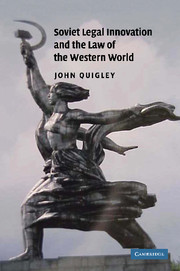Book contents
- Frontmatter
- Contents
- Abbreviations
- Preface
- Acknowledgments
- PART ONE THE SOVIET CHALLENGE
- 1 The Industrial Revolution and the Law
- 2 Economic Needs as Legal Rights
- 3 Equality in the Family
- 4 Children and the Law
- 5 Crime without Punishment
- 6 A Call to “Struggling People”
- 7 The Withering Away of Law
- PART TWO THE WEST ACCOMMODATES
- PART THREE THE BOURGEOIS INTERNATIONAL ORDER
- PART FOUR LAW BEYOND THE COLD WAR
- Notes
- Bibliography
- Index
6 - A Call to “Struggling People”
Published online by Cambridge University Press: 27 July 2009
- Frontmatter
- Contents
- Abbreviations
- Preface
- Acknowledgments
- PART ONE THE SOVIET CHALLENGE
- 1 The Industrial Revolution and the Law
- 2 Economic Needs as Legal Rights
- 3 Equality in the Family
- 4 Children and the Law
- 5 Crime without Punishment
- 6 A Call to “Struggling People”
- 7 The Withering Away of Law
- PART TWO THE WEST ACCOMMODATES
- PART THREE THE BOURGEOIS INTERNATIONAL ORDER
- PART FOUR LAW BEYOND THE COLD WAR
- Notes
- Bibliography
- Index
Summary
The soviets had new ideas not only on domestic policy but on the world at large. For the West, one of the most troubling Soviet notions related to colonialism. To the colonial powers, colonialism was legitimate, rationalized by the British as a fulfillment of the “white man's burden,” and by the French as a “civilizing mission.”
The Soviets called colonialism enslavement. The European bourgeoisie had exerted its control over Third World territories by force, and one element in the move away from capitalism to socialism would be a revolt by the peoples of these territories. The Soviets called for the self-determination of all peoples. One of the first Soviet decrees proposed “to all struggling people and their governments to begin immediate negotiations for a just democratic world.”
That was a virtual call to arms to the peoples of Africa and Asia who had been colonized by Europe. The world economy was based on the cheap labor and raw materials that Europe extracted to fuel its industrial machine.
In the nineteenth century, the European powers had taken control of most of Africa. King Leopold of Belgium got the huge central area and made it into a country that was called the Belgian Congo. The Germans and Portuguese took large chunks of central and southern Africa, and the French most of west Africa. The British took territory all over the continent.
- Type
- Chapter
- Information
- Soviet Legal Innovation and the Law of the Western World , pp. 47 - 52Publisher: Cambridge University PressPrint publication year: 2007



